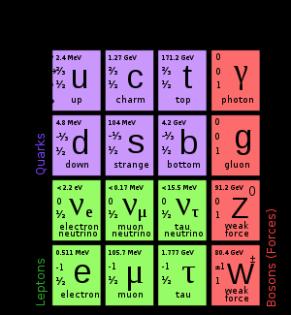
All Department members working in this field are also members of the IFT and the success of the Institute is basically shared. This activity is developed by the professors of the Theoretical Physics Department E. Álvarez, J. García-Bellido, D. García Cerdeño, B. Gavela, A. González-Arroyo, M.J. Herrero, L. Ibáñez, C. López, C. Muñoz, M. Maltoni, C. Peña, S. Rigolin and A. Sabio, together with the members of CSIC A. Casas, A. Donini, J.L. Fernández-Barbón, M. García-Pérez, C. Gómez, K. Landsteiner, E. López, J. Moreno, T. Ortín, G. Sierra y A. Uranga.
• Elementary particles phenomenology - The origin of mass.
This research focuses on the understanding of the origin of the mass of all objects in the visible universe and also on the composition of the dark sectors (dark matter and dark energy). It constitutes the core phenomenological research in high energy physics done in the group. It has an enormous importance due to its connection with the LHC accelerator, which will shortly provide new data, and to its intense collaboration with the experiments in neutrino physics. The collaboration with the high energy experimental physics group of the Department should be most fruitful. This theoretical activity of the IFT was rated by the international committee which evaluated the Strategic Plan 2010-2013(PE10-13) of CSIC institutes, achieving maximum grades: 5/5 both at CSIC and international levels.
• Fields and strings
This line focuses on theoretical aspects of research in particle physics and is of fundamental structural relevance to all other research lines. An added positive value is its connection with mathematical research topics, which can lead to increased collaboration with researchers in mathematics. The rating of the PE10-13 mentioned above is also for this line 5/5, both at CSIC and international level.
• Astroparticle Physics and Cosmology
This lines deals with the origin and composition of the Universe and spans research in astroparticle physics and cosmology. Both fields are undergoing a tantalizing transformation as a consequence of the many running experiments which provide precise results about the universe at its largest scales. Data of deep impact is expected to be available very soon, such as that from the PLANCK satellite or from dark matter experiments e.g. XENON. The collaboration and coordination in this field between IFT members (with PE10-13 rating in this area of 5/5 inside CSIC y 4/5 at an international level) and the extremely active and consolidated astrophysics group of the Department is very positive.
All Department members working on Theoretical Particle Physics are members of IFT ( Institute for Theoretical Physics, which is a mixed UAM-CSIC Institute). A description of their activities can be found in IFT
Universidad Autónoma de Madrid © 2008 · Ciudad Universitaria de Cantoblanco · 28049 Madrid